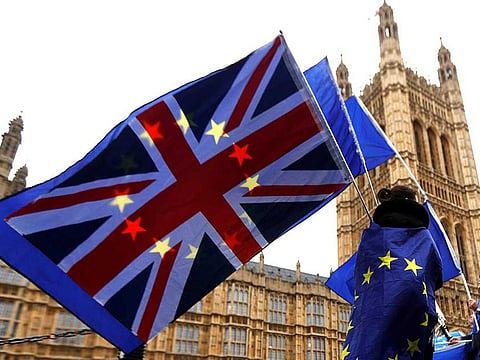Acrimony taints Britain’s divorce from the EU
The former mumblings of a no deal ‘Cliff Edge’ scenario have been replaced by loud warnings

I am British and I don’t mind admitting that as the deadline for my homeland’s exit from the European Union draws near, my anxiety heightens. Negotiations are virtually deadlocked. The atmosphere is poisonous at times.
British Prime Minister Theresa May contrives to sound positive but as the months creep on towards the March 29, 2019 deadline, her Pollyannaish statements lack real conviction. Her rose-tinted speech in Florence during September went down well with the suits in Brussels but her wish-list has not been reflected in her government’s positions according to EU officials.
The former mumblings of a no deal ‘Cliff Edge’ scenario, initially not taken seriously, have been replaced by loud warnings. Tony Blair’s former Policy Chief and Labour Peer Lord Andrew Adonis describes a crash out as a real “existential crisis” of historic proportions if a deal cannot be reached over the coming 13 months.
London and Brussels are both making contingency plans in that respect.
Michel Barnier, the EU’s chief negotiator, sees failure as “a possibility”. He has imposed a two-week deadline for the UK government to increase its divorce settlement — Britain is offering €20 billion (Dh86.6 billion), a far cry from the EU’s €70 billion invoice. Absent of clarity, talks on core issues will remain stalled.
Sticking points
David Davis, the Brexit Secretary, has revealed that the UK government is making preparations for a no-deal outcome. Foreign Secretary Boris Johnson, who campaigned hard for Brexit, throwing his boss and close friend David Cameron under a bus by so doing, insists that even without a deal Britain will do very well.
The sticking points include the legal status of Europeans in the UK and Britons living throughout Europe which if not resolved could lead to mass exodus or at best the loss of health care, welfare payments, education, the right to work as well as the obligation to apply for visas for prolonged stays.
What has not been made clear is what happens to British passports embellished with an EU strap line post March 29. Will they all expire on the day for instance and with all passport holders clamouring for replacements at once, how long will they be forced to wait? This is of particular concern to expats based in countries where work or residence visas are stamped in passports and banks oblige customers to be resident.
Moreover, a cliff edge would force flights to be grounded between the UK and EU destinations as well as flights between Britain and the US, currently authorised to fly under the US-EU Open Skies agreement.
Also problematic is what happens to the existing open border between Ireland and its neighbour Northern Ireland. Britain aspires to an open border but that is easier said than done. One option being mulled by the European Parliament is an invitation to Belfast to remain in the single market, necessitating customs formalities at entry points for visiting Britons.
The imposition of trade tariffs under the WTO could impact Britain’s competitiveness within the EU, its largest trade partner. Financial services, banking, manufacturing are just a few of the sectors bracing for unknown territory. Companies in the City of London are already relocating staff to European cities.
The Bank of England estimates that up to 75,000 jobs could be lost within the financial services industry alone, predicts a 20 per cent investment downturn and a slowing of growth.
Yes, Britain will survive. We will pull through but at what cost. I still don’t understand why a small majority of my compatriots voted to leave, many on the basis of nostalgia for the ‘good old days’ when the nation was free of Polish plumbers or because they wanted to take back their country from those awful foreigners across the Channel daring to tell us Britons what to do.
The culprit is David Cameron. There should never have been a referendum in the first place on something so crucial to the economic freedoms of this generation and those that come after. No wonder he headed for the hills!
I wonder how many politicians secretly long for a second shot now that the public is aware of the pitfalls or would like a House of Commons vote on quashing the outcome. Sadly, it is too late.
The leavers would feel betrayed by the elites. Constituents would harangue their Members of Parliament. That could even ignite mass civil unrest. Cameron dug the hole they are in and his successor shovelled in the compost.
Oh for a miracle, but in the meantime all we Britons can do is hope for the best.
Linda S. Heard is an award-winning British political columnist and guest television commentator with a focus on the Middle East.



